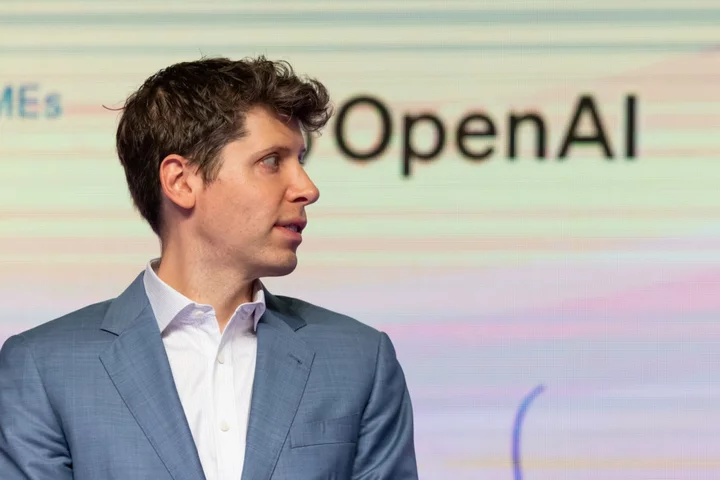This year did not begin well for technology in the UK. Venture financing evaporated. Companies cut staff and tightened belts. A bank collapse shocked startups. Bosses at two of Britain’s largest tech firms, Deliveroo and Revolut, both chastised UK regulators for stifling innovation. And the sector’s crown jewel, Arm Ltd., decamped for a US listing, spoiling London’s image as an attractive investment capital.
Then, when Prime Minister Rishi Sunak vowed to make the nation a science “superpower” by the decade’s end, executives balked at the sums of money tabled to support the ambition. This included £1 billion ($1.2 billion) to bolster domestic semiconductor development, while the US and EU announced $50 billion and €43 billion ($46.3 billion) respectively. Nigel Toon, the chief executive officer of the UK chip startup Graphcore, warned paltry investments in homegrown UK tech “will quickly be consumed” by titans overseas.
By most counts, less money is going into British tech startups now, too. In 2018, the UK and Ireland accounted for more than 34% of every VC deal across Europe and Israel, according to research firm Pitchbook. By the first quarter of 2023, that figure was down to a little under 28%. France, southern Europe and the Nordic region all increased their shares during those years.
And yet, there’s no shortage of veteran London investors unswayed in their optimism. They say there’s an opportunity for the UK to seize tech’s next wave by setting its own financing and regulation rules, distinct from Brussels and the US.
“This was the quarter that we stepped out of Silicon Valley’s shadow,” said Saul Klein, cofounder and managing partner of LocalGlobe LLP.
Klein’s enthusiasm stems from two events. In March, the UK branch of Silicon Valley Bank was snapped up by HSBC Holdings Plc after its dramatic weekend collapse, shifting Britain’s premier startup lender from an insular, risk-taking California bank into an established global institution. The swift sale showed an agility Klein believes the UK could flex more often after Brexit.
“It’s nimble enough that, especially now, given its own regulatory environment outside of the EU, you can create sandboxes for innovation,” he said. (Klein serves on Sunak’s Council for Science and Technology but said he was speaking in a private capacity.)
The other cause for his optimism was Google putting its artificial intelligence research units under the head of DeepMind, the company’s London-based AI lab — effectively placing Google’s strategic priority, the development of world-leading AI, in British hands. The worldwide craze over AI presents the UK’s best chance of becoming a tech superpower and averting a crippling backslide, according to technologists like Klein.
London is already home to numerous emerging unicorns in the red-hot field of generative AI, such as Stability AI, an open-source developer, and Synthesia, a creator of text-to-video tools. Isomorphic Labs, DeepMind’s drug-discovery spin out, is just a block away from the Francis Crick Institute, a leading biomedical center in north London.
University College of London, which produced DeepMind, has created a £120 million tech fund focused on converting AI research into commercial enterprises, and has invested in 30 startups. And, according to the data firm Dealroom, investors have put more money into AI startups in the UK so far this year than fintech companies, a first since 2011.
“When you think not just AI for AI’s sake,” Klein said, “but the applied AI — like health, like finance, like education — there’s a better chance than average it’s going to happen here first.”
The current tech craze is pulling scientists from UK’s larger institutions. Sasha Haco, CEO of London AI company Unitary, says she’s “inundated” with applications from engineers fleeing academia or bigger tech firms for the allure of startup life. “I never would have got that a year ago,” Haco said.
Another opportunity is regulation. In May, Sunak met with the chiefs of DeepMind, OpenAI and Anthropic, a California AI firm that recently opened a London office. Afterward, Sunak released a statement that said the UK was “well placed to lead the international discussion” on regulating AI appropriately. The prime minister also took a two-day visit to Washington to win President Joe Biden’s backing for his AI ambitions, among other interests, and earlier in June announced the UK would hold a global summit on AI safety later this year.
Read more: Sunak Says DeepMind to Offer UK Priority Research Access
The EU has written draft proposals for regulating AI focused on the impact on law enforcement, employment and potential misuses. In the tech sector, there’s concern the final rules, slated to be finalized this year, could extend to policing large-language models, like ChatGPT, or open-source technology.
By contrast, UK officials are looking at regulating particular applications rather than setting blanket rules overseeing the tech, according to James Hodge, group vice president for the software firm Splunk Inc., who sits on industry group TechUK’s AI committee. He said UK officials are more attuned to the risks and have discussed requiring companies to disclose training data and computing resources used in AI models, like food labeling. Hodge described the government’s approach as a “really, really positive step.”
It might not be enough. Nathan Benaich, a London-based AI investor with Air Street Capital, believes softer regulation alone isn’t going to give the UK any competitive edge. “Much more urgent,” he said, “is injecting significantly more ambition into our science and tech strategy.” Salaries in the UK remain relatively low, however — a brutal recruiting handicap when many machine learning specialists can fetch salaries in the seven figures.
Raza Habib, the founder of Humanloop, a startup that makes software tools for businesses using AI models like ChatGPT, said Sunak’s meeting with industry leaders was a welcome sign. But he noted that startups tend to gravitate to places where there are ample engineers and potential customers.
“London is probably the second-best place,” Habib said. “It’s still hard to beat San Francisco.” His startup is planning to open an office in the US soon.









